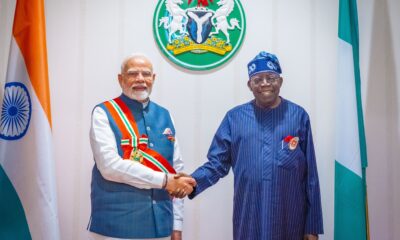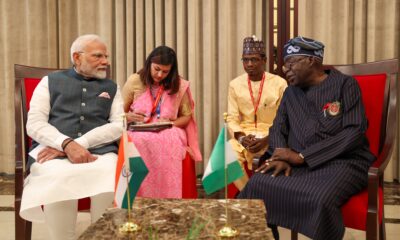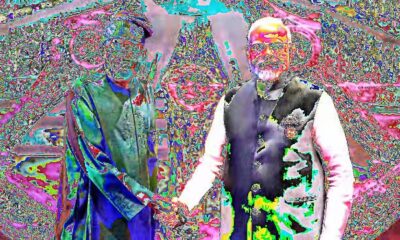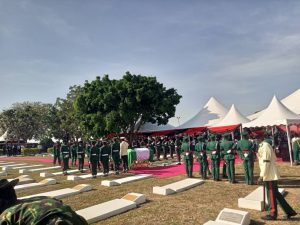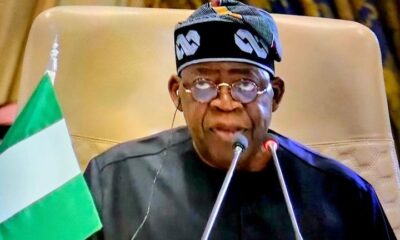NEWS
Tinubu Urges World Leaders To Deepen Ties Among Member States
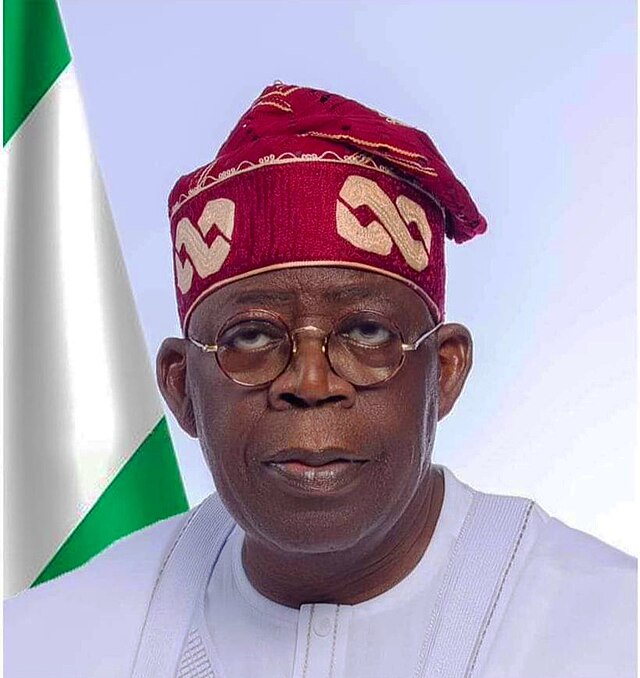
. . . Insists on permanent seat for Nigeria, other African nations at UN Security Council
. . . Calls for collective action against hunger, terrorism, climate change, others
. . . Seeks renewed financial architecture, debt forgiveness for developing countries
. . . Says pursuit of individual national priorities undermining resolutions of global challenges
President Bola Ahmed Tinubu has called on world leaders to recommit themselves to multilateralism by deepening relations among member states of the United Nations (UN) in line with the principles of inclusivity, equality and cooperation.
This, he said, is the surest guarantee of global action against existential challenges faced by the international community.
ALSO READ: Shettima Leads Nigeria’s Delegation To 79th UNGA
President Tinubu who is the Chairman of the Authority of Heads of States and Government of the Economic Community of West African States (ECOWAS) made the call while addressing world leaders during the General Debate of the ongoing 79th Session of the United Nations General Assembly (UNGA) at the UN headquarters in New York, United States.
Represented by his deputy, Vice President Kashim Shettima, at the high-level annual global event, the President decried the steep descent to singularity and nationalism which, according to him, are undermining the quest for peaceful and collective resolution of global challenges such as terrorism, climate change, poverty, food crises, hyper-inflation, nuclear proliferation and grinding debt burden, among others.
The Nigerian leader reminded the world leaders that the United Nations stands for multilateralism which represents inclusiveness, anchored on the tripod of peace, sustainable development and human rights.
He expressed worry about the main objectives of the UN and how it could sustain the global body’s relevance and resilience, noting that the pillars of the organisation are at risk of being broken against the principles of inclusivity, equality and cooperation which it stands for.
President Tinubu stated: “Today, these pillars of our organisation are threatened. They risk being broken by the relentless pursuit of individual national priorities rather than the collective needs of the nations that are assembled here today.
“While commitment to multilateralism offers us the surest guarantee of global action to address the existential challenges we face, singularity and nationalism are undermining the aspirations towards the peaceful and collective resolution of such challenges.
“From last year’s summit, and indeed from previous years, we have carried over the numerous challenges of terrorism, armed conflict, inequality, poverty, racial discrimination, human rights abuses, food crises, hunger, irregular migration, piracy, global pandemics, hyper-inflation, nuclear proliferation, grinding debt burden, climate change, and a host of other vexations.
“The continued manifestation of these challenges testifies to our failings rather than to any lofty achievements on our part. Billions of dollars are being committed to the prosecution of wars and the fanning of the embers of conflict.”
Not satisfied, the President reaffirmed what he termed “Nigeria’s steadfast commitment to the deepening of multilateralism,” just as it did 65 years ago when it “joined the United Nations as the 99th Member-State.
“We remain committed to that “desire to remain friendly with all nations and participate actively in the works of the United Nations”, as expressed by our founding Prime Minister, Sir Abubakar Tafawa Balewa.”
President Tinubu also lamented what he described as the return of unconstitutional changes of government and forceful military coups in some African countries, saying these coups attest to how fragile democracy could become when it is not supported by economic development and sustained peace and security.
This, he said, should be of utmost concern in deliberations at the high-level segments of the 79th Session of the UN General Assembly, as the forceful changes of government have led to “the impatience in cities and villages at the sometimes slow and grinding turn of the wheel of democracy.
“Our people need employment. They need decent livelihoods. They desire good and affordable education and healthcare for their children and families. They need to live in healthy, safe and secure environments. They need hope and they need opportunity,” he added.
President Tinubu also called for reforms in the international financial architecture and a transparent multilateral trading system, expressing hope that “the adoption of the “Pact for the Future” will change the narrative, reposition economies and translate into concrete measures that provide solutions to the challenges faced by developing and least developed countries.
“It is for this and other reasons that we reiterate the call by countries, especially of the global South, for reform of the international financial architecture and promotion of a rules-based, non-discriminatory, open, fair, inclusive, equitable and transparent multilateral trading system,” he noted.
Emphasizing the dangers of digressing from multilateralism, the Nigerian leader also drew the UN’s attention to the global debt burden undermining the ability of countries and governments to meet the needs of their citizens, trade barriers and protectionist policies destroying the hopes for nations, and the uncontrollable competition discouraging motivation and hampering global investments.
Specifically, he asked the UN to prioritise debt forgiveness for Nigeria and other developing countries from creditors and multilateral financial institutions.
“Similarly, we must ensure that any reform of the international financial system includes comprehensive debt relief measures, to enable sustainable financing for development. Countries of the global South cannot make meaningful economic progress without special concessions and a review of their current debt burden,” he stated.
The Nigerian leader called for the recovery of the proceeds of corruption and illicit financial flows, maintaining that the return of such funds to countries of origin “is a fundamental principle of the United Nations Convention against Corruption.
“Therefore, the international community must promote practical measures to strengthen international cooperation to recover and return stolen assets and to eradicate safe havens that facilitate illicit flows of funds from developing countries to the developed economies,” he added.
On insecurity, President Tinubu noted that the menace is plunging citizens into untold hardship and misery that, in turn, affect the people’s confidence in democracy, emphasizing that bringing back confidence in democratic rule and constitutional order is the duty of the international community.
“We cannot build durable societies with the threat of terrorism, banditry and insurgency growing in our countries and regions. Indeed, violent extremism remains an existential threat to both national and international peace, security and development. We are making concerted efforts to contain and roll back this threat,” he said.
President Tinubu however assured that the “High-Level African Counter-Terrorism Meeting hosted by Nigeria in April 2024 and its outcome – “The Abuja Declaration” – promises to provide solutions to the challenges presented by terrorists and insurgents.”
He also warned against the dangers of climate change, describing it as a driver of insecurity that poses a veritable challenge to sustainable development, even as he recalled the devastating flood in Nigeria which submerged large areas of the country, “including one of our largest cities, Maiduguri, in the North-East.”
The Nigerian leader implored the international community to stick to the implementation of the commitments made at the various COP meetings, pointing out that failure to do so would amount to postponing the inevitable, as no country is immune from the effects of climate change.
The President who observed that conflict prevention is the main reason why the UN was established regretted that the task of preventing these conflicts has become arduous following their normalisation “when even the condemnation of violence and civilian casualties, and calls for a ceasefire, are somehow regarded as controversial”.
He listed some of the root causes of conflicts to include poverty, hunger, ignorance, inequality and exclusion, as well as other forms of injustice, just as he cited the conflict in Sudan and the war in Gaza and other Palestinian territories.
“What this tells us is that the international community has failed to live up to the spirit and aspirations of the United Nations to rid the world of inequality, violence and domination of one people by another. Justice is antithetical to revenge,” he stated.
President Tinubu further insisted on bold reforms in the UN Security Council with a view to giving Nigeria and other African countries permanent seats at the council, stressing that it has since become imperative for the UN to strengthen its relevance and credibility in a rapidly changing world.
He said, “Some permanent members of the United Nations Security Council have offered encouraging, if tentative indications of support on the issue of reform of the Council. We welcome the change in tone and urge an acceleration in momentum to the process.
“The Security Council should be expanded, in the permanent and non-permanent member categories, to reflect the diversity and plurality of the world. We fully support the efforts of Secretary-General Guterres in this regard.
“Africa must be accorded the respect that it deserves in the Security Council. Our Continent deserves a place in the permanent members category of the Security Council, with the same rights and responsibilities as other Permanent Members.”
NEWS
N1.7trn Loan: Atiku Blames NASS For Worsening Nigeria’s Debt Burden
Former Vice President, Atiku Abubakar has criticized the federal government’s plan to secure an additional N1.7 trillion loan through Eurobonds to cover a shortfall in the 2024 budget, describing the borrowing as unsustainable and harmful to Nigeria’s economy.
In a statement shared on Thursday via his X (formerly Twitter) handle, Atiku accused the Bola Tinubu-led administration of burdening Nigerians with debt while failing to provide clear answers about the country’s fiscal challenges.
READ ALSO: CSR: Dangote Cement Fuels Education With Support Projects At Lagos Schools
He also faulted the National Assembly for enabling what he called a “voracious appetite” for loans.
The former Peoples Democratic Party (PDP) presidential candidate expressed alarm over a recent World Bank report ranking Nigeria as the third most indebted country to the International Development Association (IDA), calling the development troubling.
“The recent report released by the World Bank, showing Nigeria as the third most indebted country to the International Development Association (IDA), is very concerning,” Atiku stated.
He raised further concerns about the government’s decision to benchmark the proposed loan at an exchange rate of 1 USD to N800, despite the Central Bank of Nigeria’s official rate being over N1,600.
“What makes this particular loan proposal even more concerning is that it is benchmarked at the exchange rate of 1 USD to N800, whereas the current exchange rate from the Central Bank of Nigeria stands at over N1,600 to 1 USD,” he said.
Atiku questioned the need for additional borrowing, given the government’s earlier claims of record-high revenue collection.
“In July this year, Tinubu boasted that the FIRS and Customs under his watch had collected all-time high revenues to finance the budget. Why are they still borrowing?” he said
He accused the government of a lack of transparency, describing the borrowing spree as detrimental to Nigerians already struggling under economic hardship.
“There is something that they are not telling Nigerians, even as they are being crushed by a combination of their failed trial-and-error policies and loan rackets.”
Atiku also referenced a report by BudgIT, a budget monitoring group, which criticized the 2024 budget for its inefficiencies.
He alleged that corruption, rather than infrastructure or development needs, was driving the government’s borrowing decisions.
“These loans are powered by corruption and not for infrastructure and development needs. This voracious appetite for humongous loans is deeply concerning,” he said.
Reflecting on Nigeria’s financial history, Atiku lamented the return to significant foreign indebtedness just years after former President Olusegun Obasanjo’s administration cleared the country’s debt.
“It is agonizing to see that just a few years after the Obasanjo administration took us out of foreign indebtedness, we are today back at the top spot in the same conundrum,” he stated.
He called for a more cautious approach to borrowing, urging the government to prioritize fiscal responsibility and transparency to avoid worsening Nigeria’s economic challenges.
International News
ICC Issues Arrest Warrants For Israeli Prime Minister Netanyahu, Others
The International Criminal Court (ICC) has taken a historic step, issuing arrest warrants for Israeli Prime Minister Benjamin Netanyahu and former Defense Minister Yoav Gallant.
The charges include crimes against humanity and war crimes allegedly committed during Israel’s recent assault on Gaza.
In a detailed statement, the ICC accused the Israeli leaders of “intentionally and knowingly depriving the civilian population in Gaza of objects indispensable to their survival, including food, water, and medicine and medical supplies, as well as fuel and electricity.”
READ MORE: Osun Govt Decries Attempted Murder Of Park Mgt Chairman By Police
The ICC’s move marks a significant escalation in international scrutiny of the Israeli-Palestinian conflict. Netanyahu and Gallant are alleged to have orchestrated policies that caused severe harm to the civilian population in Gaza, leading to widespread condemnation from human rights organizations.
Alongside the charges against Israeli officials, the ICC also issued an arrest warrant for Hamas military commander Mohammed Deif. Deif has long been a central figure in Hamas’s military operations. Israel’s military claims to have killed him in a July airstrike, although this has not been independently verified.
The warrants highlight growing calls for accountability amid the ongoing conflict in the region. The ICC’s actions are likely to provoke heated debate and may complicate diplomatic efforts aimed at resolving the crisis.
With the warrants issued, global attention now turns to how the international community will respond and whether any practical steps will be taken to enforce them.
NEWS
Edo State Governor Sets Up Committee To Recover Missing Gov’t Vehicles
Governor Monday Okpebholo of Edo State has inaugurated a 12-member committee tasked with recovering government vehicles reportedly in private hands.
The committee, led by Kelly Okungbowa, has been given a two-week mandate to retrieve the vehicles and ensure their return to the state government.
READ ALSO: Finnish Police Arrest Simon Ekpa Over Terror-Related Allegations
Speaking during the inauguration ceremony in Benin City, Governor Okpebholo emphasized the importance of accountability in the management of public resources.
He urged the committee to carry out its assignment thoroughly and within the bounds of the law.
In his response, Okungbowa expressed gratitude to the governor for entrusting the team with the assignment, vowing to deliver results within the stipulated timeframe.
“A lot of vehicles used by the past administration are missing, as those in custody of the vehicles have refused to return them,” Okungbowa said.
“The governor deemed it fit to inaugurate us today with a mandate to recover all government vehicles in private hands.”
The committee, which includes representatives from Edo’s three senatorial districts, is set to investigate and recover the vehicles based on credible intelligence already at their disposal.
“We already have vital information regarding some persons still holding government vehicles,” Okungbowa stated. “We will do the job according to the law, and both the government and the people will be satisfied with the outcome.”
He also called on members of the public to assist the committee by providing information about any government vehicles that may still be in private possession.
“We want to appeal to members of the public who might be aware of anyone still keeping government vehicles in their houses to please inform us to enable the committee to recover such for the Edo State Government,” Okungbowa said.
The committee’s vice chairman, Rt. Hon. Victor Edoror, a former Speaker of the Edo State House of Assembly, will work alongside other members to ensure the success of the initiative. The public can reach the committee at 08110165121.

